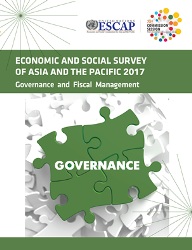India expected to achieve 7.1% growth in 2017: UN report
Thursday 4th of May 2017

Sharing is caring
A United Nations (UN) on 1 April 2017 released its annual flagship report titled'The Economic and Social Survey of Asia and the Pacific 2017 '. The report was published by UN Economic and Social Commission for Asia and the Pacific (ESCAP).
The report says India is required to achieve 7.1 % economic rise in 2017 as re-monetisation restores consumption and infrastructure spending increases. The report said India's growth would edge as long as 7.5 % next year. These targets shall be met by higher private and public consumption and increased infrastructure spending.
Also, the report also warns India by proclaiming that the nation faces heightened risks related towards the power of bad loans inside public sector banks.
Other highlights from the projection
Inflation – It was subsequently projected to always be between 5.3 % to 5.5 % in 2017 and 2018, so this means it could be above the official target of 4.5 % to 5 per cent.
Bad Loans - The report also highlights that power of unhealthy loans inside public sector banks carries a risk inside financial sector because it reached almost 12 % in 2016, which points to the necessity of bank recapitalization.
Reports take on Demonetisation
The annual report from ESCAP said that the economic conditions were heavy in late 2016 and early 2017 due in an unexpected removal/withdrawal of the two biggest banknotes from the forex market in November 2016. These banknotes were subsequently replaced with the revolutionary currency. It says, this withdrawal took a liquidity crunch, which in result delayed payments of wages and buying of inputs in the commercial sector.
The report says, the impact of demonetization on the economy is required to be transient for a slower-than-expected recovery would particularly diminish the outlook for cash-intensive sectors and still provide chains for agricultural products. In regard towards the same, the report also speaks about this 2017-18 that demands measures that hopefully will seek to mitigate the larger temporary adverse shocks on income and wealth, similar to expanding a low-cost housing scheme and providing more relief towards the agricultural sector and credit support for small enterprises.
Notwithstanding its short-term disruptions, one of the medium-term benefits from the demonetization that were held would have been to help expand banking sector liquidity. The country's medium-term economic development will even take advantage of recent reforms which have been targeted at easing domestic supply bottlenecks, including the implementation from the goods and services tax, amendment of the bankruptcy law and examining from the pharmaceuticals, defence and civil aviation sectors.
Sharing is caring
Related Post
Indian team win 1 silver, 2 bronze in Archery World Cup
Satellite-monitored laser walls activated along India Pakistan border
Arunachal Pradesh: Students Union protest against China's claim over renaming places in state
58th Grammy's Award 2016
68th Army Day celebrated on 15 January In India
Union Cabinet approves Mega Spectrum Auction